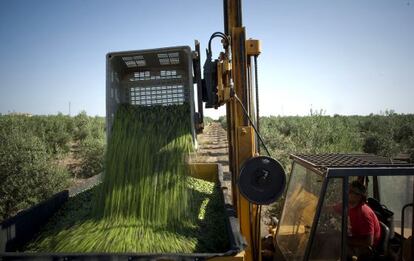Olive groves present new power source
Austrian firm KWB pioneers the use of pits in production of domestic heating

In an average season Spain produces around six million tons of olives, which are comprised of 15 percent pit. Between the seasoning and olive oil pressing industries, which pit the large majority of the fruit they process, more than 450,000 tons of these seeds are amassed, a by-product of the olive groves that has recently emerged as a source of electricity and thermal biomass generation.
Olive pit fuel has excellent properties due to its high density, humidity of 15 percent and elevated calorific content. Because of these qualities olive pits are gaining greater importance in the domestic and residential sectors in the supply of hot water and central heating. An Austrian firm, KWB, has now become the first supplier of biomass boilers to officially guarantee customers over the use of pits in its Multifire brand apparatus.
"Other brands are using pits as well, and the makers allow for the use of pits in their apparatus, but only KWB offers a guarantee with the corresponding technical data, thanks to the excellent results achieved in their research," says Miguel González, director of HCIB Engineering and Biomass, official distributor for KWB boilers in Spain.
KWB offers a three-year full-service maintenance guarantee and up to eight years for the replacement of heat exchangers.
Olive pits present an opportunity for employment that is not delocatable"
The Austrian company has been working to develop olive pits since 2005, when it began to install its first biomass boilers. Members of the board and journalists from Austria, Germany and Italy recently traveled to Jaén, the Andalusian city at the heart of the country's foremost olive-producing region, to see how the use of pits in biomass heating units works.
This year, a residential home for senior citizens in Matamala de Almazán, Soria, installed two KWB biomass boilers that will allow it to meet its energy needs for heating and sanitary hot water.
As well as olive oil production, Jaén is the leader in Spain in the use of thermic energy produced via biomass, with 26 percent of Andalusia's entire consumption (158.52 kilotons of biomass) and more than 4,000 thermic installations, 20 percent of the regional total.
One of the newest such plants has been opened by Probiosur, in Baeza, a cooperation between Aceites del Sur, Coosur - which provides the pits - and García-Munté Energía, which has a long history in the renewables market and is now promoting olive fuel for heating. Its processing capacity is 50,000 tons of pits a year and investment now totals over a million euros, 25 percent of which has come through a regional government subsidy.
"Olive pits present an opportunity for employment that is not delocatable, that is to say it has to be carried out in our mountains and in this sea of olive groves in Jaén," says the provincial assembly leader, Francisco Reyes.
Tu suscripción se está usando en otro dispositivo
¿Quieres añadir otro usuario a tu suscripción?
Si continúas leyendo en este dispositivo, no se podrá leer en el otro.
FlechaTu suscripción se está usando en otro dispositivo y solo puedes acceder a EL PAÍS desde un dispositivo a la vez.
Si quieres compartir tu cuenta, cambia tu suscripción a la modalidad Premium, así podrás añadir otro usuario. Cada uno accederá con su propia cuenta de email, lo que os permitirá personalizar vuestra experiencia en EL PAÍS.
¿Tienes una suscripción de empresa? Accede aquí para contratar más cuentas.
En el caso de no saber quién está usando tu cuenta, te recomendamos cambiar tu contraseña aquí.
Si decides continuar compartiendo tu cuenta, este mensaje se mostrará en tu dispositivo y en el de la otra persona que está usando tu cuenta de forma indefinida, afectando a tu experiencia de lectura. Puedes consultar aquí los términos y condiciones de la suscripción digital.









































